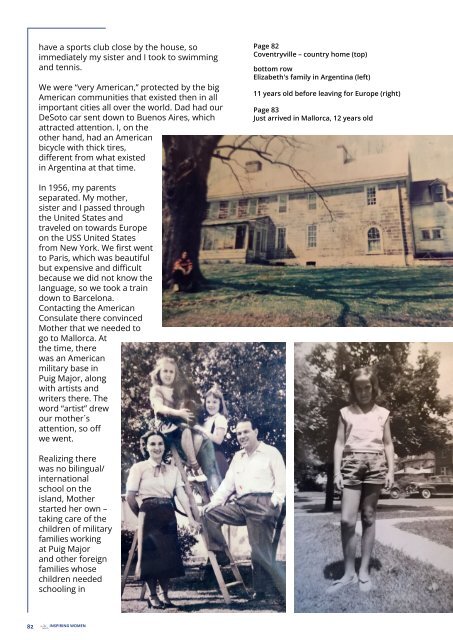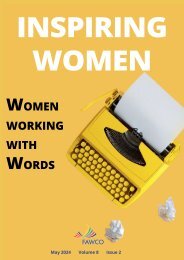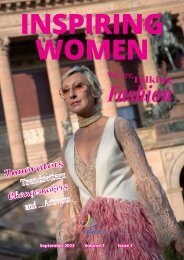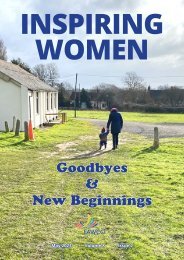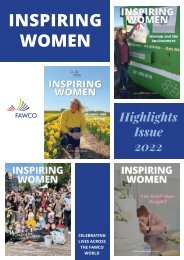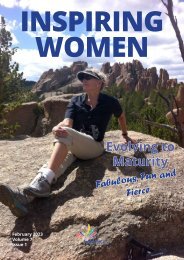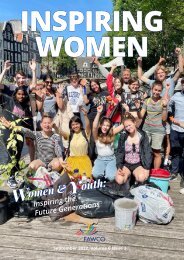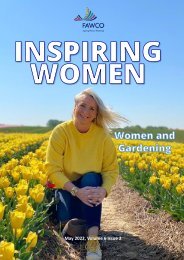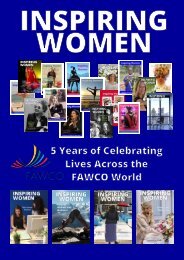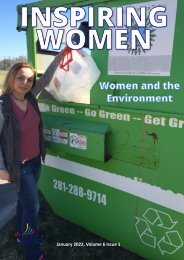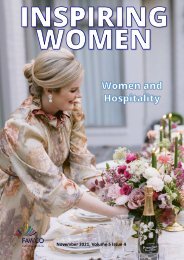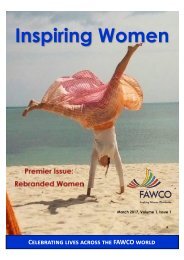Inspiring Women Magazine November 2023
Create successful ePaper yourself
Turn your PDF publications into a flip-book with our unique Google optimized e-Paper software.
have a sports club close by the house, so<br />
immediately my sister and I took to swimming<br />
and tennis.<br />
We were “very American,” protected by the big<br />
American communities that existed then in all<br />
important cities all over the world. Dad had our<br />
DeSoto car sent down to Buenos Aires, which<br />
attracted attention. I, on the<br />
other hand, had an American<br />
bicycle with thick tires,<br />
different from what existed<br />
in Argentina at that time.<br />
In 1956, my parents<br />
separated. My mother,<br />
sister and I passed through<br />
the United States and<br />
traveled on towards Europe<br />
on the USS United States<br />
from New York. We first went<br />
to Paris, which was beautiful<br />
but expensive and difficult<br />
because we did not know the<br />
language, so we took a train<br />
down to Barcelona.<br />
Contacting the American<br />
Consulate there convinced<br />
Mother that we needed to<br />
go to Mallorca. At<br />
the time, there<br />
was an American<br />
military base in<br />
Puig Major, along<br />
with artists and<br />
writers there. The<br />
word “artist” drew<br />
our mother´s<br />
attention, so off<br />
we went.<br />
Realizing there<br />
was no bilingual/<br />
international<br />
school on the<br />
island, Mother<br />
started her own –<br />
taking care of the<br />
children of military<br />
families working<br />
at Puig Major<br />
and other foreign<br />
families whose<br />
children needed<br />
schooling in<br />
Page 82<br />
Coventryville – country home (top)<br />
bottom row<br />
Elizabeth's family in Argentina (left)<br />
11 years old before leaving for Europe (right)<br />
Page 83<br />
Just arrived in Mallorca, 12 years old<br />
English. Her school still exists and is among the<br />
best: Baleares International College. However,<br />
I could not wait for it to open, so I took up my<br />
studies in a Spanish school.<br />
It was a curious period. Franco had power and<br />
restrictions were imposed. By that time tourists<br />
were starting to flood in, but the Mallorquin<br />
society still found it difficult to accept the<br />
changes that “we” foreigners brought with us.<br />
When I was 17 years old, I arranged to travel<br />
to Bordeaux, France, to study language and<br />
literature at the university. There I met a<br />
very nice Spanish boy. He wanted to return<br />
to Madrid, and, after two years studying in<br />
France, I followed him. There I continued my<br />
studies, focusing on commerce, tourism, and<br />
translations. I also began attending St. George’s<br />
Anglican church.<br />
We married, but since I insisted upon remaining<br />
Anglican, they would not authorize us to marry<br />
at the main altar in any Catholic church, so I had<br />
to pick the nicest sacristy I could find and we<br />
were married there! We had two beautiful<br />
children. We divorced in 1991.<br />
I started to work for The Finnish Paper Mills<br />
Association in Madrid, selling newsprint paper<br />
to Spanish newspapers. After 25 years, I<br />
changed to a Swedish company, Holmen Paper,<br />
which was also dedicated to newsprint and<br />
special qualities for magazines. I retired from<br />
this company with a total of 45 happy years<br />
of working.<br />
Tell us about your arrival in your new country.<br />
The arrival with my mother and sister to the<br />
island went well. It was October. The weather<br />
was warm and I found the island beautiful and<br />
relaxing. Knowing the language and coming<br />
from another foreign country, where I was used<br />
to cultural differences, made it easier for me<br />
upon arriving in Spain. Patience, common sense<br />
and respect is the name of the game.<br />
What was something about your new country<br />
that you were not expecting? What surprised<br />
you the most?<br />
I can recall answering the door one day. There<br />
was a nice man leaving an enormous block of<br />
ice on the floor in front of me. I waited for<br />
instructions as to what to do with it. My mother<br />
finally told me it was for the icebox. She then<br />
had to explain how the country was a few years<br />
behind. She laughed and said it was like living<br />
her youth over again!<br />
Having a good appetite, I found the food good.<br />
No objections there, although it did take me<br />
time to accept the snails they so eagerly offered<br />
in the restaurants.<br />
What were the biggest challenges you had to<br />
overcome adapting to your new country?<br />
There were several cultural differences that,<br />
as an American girl, I found challenging. For<br />
instance, Spanish girls my age could not wear<br />
“shorts” and should never be seen with the boys<br />
of the neighborhood. This was difficult for me<br />
because I was used to playing sports with boys<br />
(and beating them). The late lunch and dinner<br />
hours also took some getting used to.<br />
The holiday season was also difficult. It was<br />
impossible to find a turkey for Thanksgiving or<br />
a Christmas tree for Christmas - only manger<br />
replicas and porcelain figures.<br />
82 INSPIRING WOMEN INSPIRING WOMEN 83


